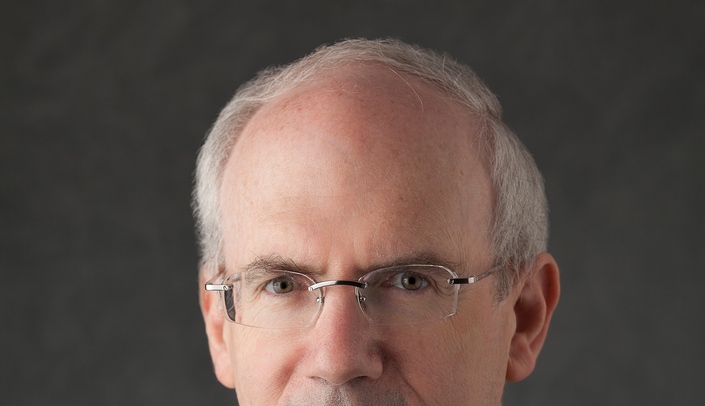The problem of rural health shortages and what communities in rural America can do to increase the number of health professionals was the topic of the Nashville-based RFD-TV's "Rural America Live" show on Monday.
University of Nebraska Medical Center Chancellor Jeffrey P. Gold, M.D., appeared on Monday's live broadcast to discuss how to build a pipeline of health care professionals to rural America. He was joined by Ted Epperly, M.D., president and CEO of the Family Medicine Residency of Idaho, which provides training for resident physicians and fellows in rural Idaho. His programs are recognized as some of the best in the country for recruiting and retaining health professionals in rural Idaho.
Drs. Gold and Epperly spoke remotely from Omaha for the hourlong broadcast.
About 20% of the U.S. population lives in rural areas but only about 9% of the physician workforce is there, and only about 5% of medical school graduates are going to rural America.
Rural communities are disproportionately underserved when it comes to physicians, pharmacists, dentists and specialists. These professionals tend to be aging out in place, and there’s no one in the wings waiting to replace them.
"Rural America Live" — formerly titled "RFD-TV Live" — is the longest-running show produced by RFD-TV. You can find RFD-TV on local television providers.
Below are transcriptions for the link which contains mp4 video and mp3 audio soundbites.
https://www.dropbox.com/sh/6du28wttsyre5uz/AAB5kpOyIOE8abbMY-061Cxza?dl=0
Ral mp4 Video bite 1.mp4
Ral mp4 soundbite 1.mp4
Ted Epplerly, M.D., president and CEO, Family Medicine Residency of Idaho, talks about the most demanded health care services.
“Three or four critical services that all rural areas in America face: primary care, mental health care, general surgical services and pharmaceutical care. Part of the challenge of the team will be to make sure that those services get performed in those communities with the whole mantra of the highest quality of care as close to home as possible.”
Ral mp4 Video bite 2.mp4
Ral mp4 soundbite 2.mp4
Jeffrey P. Gold, M.D., chancellor of the University of Nebraska Medical Center and the University of Nebraska at Omaha, talks about what communities can do to attract and retain health professionals.
“It’s not just mentorship. Scholarships is another big deal. It takes a long time to be educated to be a physician, a nurse or a pharmacist. Obviously a lot of hard work. Communities can also create scholarships, build new programs and create hiring incentives. Most importantly, this is about identifying young women and young men in rural communities that potentially want a career in health care and having the opportunity to bring them back.”
Ral mp4 Video bite 3.mp4
Ral mp4 soundbite 3.mp4
Jeffrey P. Gold, M.D., chancellor of the University of Nebraska Medical Center and the University of Nebraska at Omaha, talks about what communities can do to attract and retain health professionals.
“The single highest predictor in my experience, is that an individual who grew up in a rural community has had a learning experience in a rural community – that is to say a rural clinical rotation and has got family and friends that live in a rural community – that’s the highest magic about getting them to come back. At the end of the day, it’s where grandma and grandpa are. Let’s face it. when you make that phone call, you don’t want the message, you know, I’m four hours away. That proximity really makes a difference.”
Ral mp4 Video bite 4.mp4
Ral mp4 soundbite 4.mp4
Ted Epplerly, M.D., president and CEO, Family Medicine Residency of Idaho, gives advice to communities trying to attract health professionals
“Please be proactive with this. Don’t feel like you’re passive in this process. If nothing like this is happening in your community, start to make it happen. Go to the leaders in your community…and start the conversations in your communities. At the end of that pipeline are good results in terms of building your workforce for your community.”
Ral mp4 Video bite 5.mp4
Ral mp4 soundbite 5.mp4
Ted Epplerly, M.D., president and CEO, Family Medicine Residency of Idaho, gives advice to communities trying to attract health professionals.
“Take bold steps – start to step out and have the workforce that you desire be created by proactive steps to get the sorts of folks there. I’m talking about way more than physicians. We’re talking nurses, PAs, nurse practitioners, sociologists, social workers, community health workers. We’ve been working hard in the last decade in this country to try to also evolve the payment systems so payment gets away from pay for service – see one, do one, bill one to then value-based payments. That’s why the team becomes important.”
Ral mp4 Video bite 6.mp4
Ral mp4 soundbite 6.mp4
Jeffrey P. Gold, M.D., chancellor of the University of Nebraska Medical Center and the University of Nebraska at Omaha, talks about talks about the success of UNMC’s Rural Health Opportunities Program.
“What it has done is it provided a tremendous incentive both not just a financial incentive – but a clear goal, a destination where these young women and young men say I’m going to be a fill in the blank, and I have a career goal and by the way I’m coming back to my home community. And we have 20 years of data that these young men and women do actually come back and stay in these communities.”
We are Nebraska Medicine and UNMC. Our mission is to lead the world in transforming lives to create a healthy future for all individuals and communities through premier educational programs, innovative research and extraordinary patient care.
Twitter | Facebook | Instagram | YouTube | Flickr
RFD-TV show offers solutions for rural health workforce shortages
- Written by Vicky Cerino
- Published May 2, 2019

Media Contact
Vicky Cerino
UNMC Strategic Communications
(402) 559-5190
(402) 559-4353
vcerino@unmc.edu